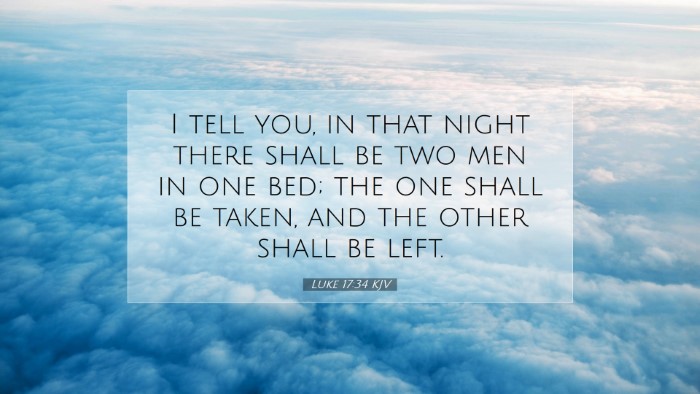Commentary on Luke 17:34
Luke 17:34 states: "I tell you, in that night there shall be two men in one bed; the one shall be taken, and the other shall be left." This verse is part of a larger discourse on eschatology and the unpredictability of the coming of the Kingdom of God. Below is a summary of insights from various public domain commentaries to shed light on this significant scripture.
Contextual Analysis
Matthew Henry emphasizes the importance of understanding the context of Jesus’ teachings about the end times. He notes that this verse illustrates the suddenness of Christ's return and the division it will cause. Jesus compares the situation of two men in a bed to reflect how His coming will unexpectedly separate the righteous from the unrighteous.
Albert Barnes expands on this by suggesting that the phrase "in that night" signifies a time of spiritual darkness when the world may be unaware of the impending judgment. He asserts that the separation will be based on the spiritual condition of individuals rather than their external circumstances.
Theological Implications
This verse raises profound theological questions concerning predestination and free will. Adam Clarke discusses how the imagery of duality—two men sharing the same space yet experiencing different fates—reflects the biblical principle that proximity to God or to righteousness does not guarantee salvation. One can be surrounded by godliness but still remain unfaithful.
- The necessity of personal faith: Clarke highlights the importance of individual faith, as salvation is not conferred by mere association but through one’s relationship with Christ.
- The unpredictability of the end times: Both Henry and Barnes point out the theme of unexpectedness in Christ's return. The terms of 'taken' and 'left' suggest a sudden action that contrasts with human expectations of the timing of divine intervention.
Illustrative Examples
Matthew Henry further illustrates this point by drawing on historical examples of sudden calamities that befall individuals, which serve as reminders of preparedness and vigilance in spiritual matters. He likely refers to accounts from Genesis, where the righteous were removed from impending judgment on Sodom and Gomorrah, highlighting both God’s mercy and the severity of judgment.
Application for Modern Believers
The insights drawn from this passage are invaluable for contemporary believers, pastors, and theologians. Inspired by Albert Barnes, the call to vigilance can be seen as a directive for Christians today to cultivate a lifestyle that reflects readiness for the return of Christ. This passage challenges believers to examine their own lives, ensuring they are spiritually equipped and actively participating in the mission of the Gospel.
Moral Responsibilities
- Personal Reflection: Like the men in the bed, believers are encouraged to reflect on their personal relationship with God, ensuring that they are living in a way that is consistent with being chosen by God.
- Community Vigilance: It urges communities of faith to encourage one another, being watchful and supportive as they await Christ’s return.
Conclusion
In conclusion, Luke 17:34 serves as a profound reminder of the suddenness and seriousness of the return of Christ. As outlined through the commentaries of Matthew Henry, Albert Barnes, and Adam Clarke, believers are called to remain vigilant and faithful, understanding that proximity to salvation does not equate to possession thereof. The need for personal faith, continuous engagement with God’s Word, and community support are emphasized, calling every believer to a deeper commitment and awareness as they await the glorious return of their Savior.


